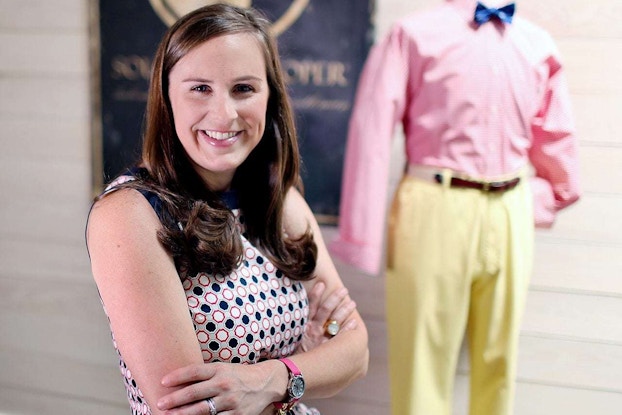
Emmie Howard, the founder of Southern Proper, loved her scallop shirt. It was her signature look. She designed it and fell in love with it.
And now, suddenly she was surrounded by them, swimming in a warehouse surrounded by rows and rows of scallop shirts, alongside tons of women's and children’s clothing that she spent a considerable amount of money on. And no one was buying.
“It was a horrible day,” said Howard. “We had so much excess inventory, and all I remember thinking is ‘We have to get out from this.’”
Howard, the founder of the ultra cool clothing brand Southern Proper started her company in 2005 with a line of bow ties and neckties for the southern gentleman as a tribute to the southern preppy style, and her dapper grandpa. Now, her clothes are sold in 300 retail stores across the country and online. Growing up on a cotton farm in West Tennessee her southern roots reflect in everything she makes.

Interested in a small business membership?
Find out how the U.S. Chamber of Commerce can help your company grow and thrive in today's rapidly-evolving business environment. Connect with our team to learn how a small business membership can benefit your bottom line and help you achieve your goals.
The brand has proved very popular with customers, allowing the young company to expand their offerings to boxers, hats, oxfords, polos and more. They have become especially popular with wedding parties, sports enthusiasts, and fraternity boys.
As the company grew a lightbulb went off: her customers were primarily women, buying clothes for the men in their lives. Why not make clothes for women and their families. She couldn't have been more wrong.
Like any entrepreneur, Howard has been up and she’s been down. Howard tells us what she learned from trying to expand too fast, and how staying true to what she did well helped her survive, and what keeps her going.
1. Don’t Lose Focus on What You Do Well
“When we started we were growing slowly and organically, and we would introduce a couple of new products at a time. And then we hit our stride and starting seeing huge growth. We were having a lot of success as a lifestyle brand, and it was a validating feeling.”
“It seemed a no-brainer to create a woman’s and kid’s line of clothing. So we did. And put significant capital behind it. Not only did that line struggle, but while we were rolling that out we lost focus on the men’s business. We just had too much on the table. We spent less time on what was working for us and more time on what wasn't and that was a mistake, and a valuable lesson learned.
2. Relying on Data Isn’t Enough.
“We had the numbers that supported started a woman’s and a children’s line, and we thought that would be enough. We didn’t fully appreciate is that men are less complicated than women. We should have known that, being a mostly female driven business. Ladies want to see new things in stores every month whereas men might go shop for the season one time and buy things here and there. We didn’t get the right help and we tried to move too fast. All-in-all, we did too much and we used a lot of our capital to do it. We had to take a step back to move forward again.”
3. Be passionate, but Don’t Fall in Love With Your Product.
“It’s hard not to get attached to your product. It’s like your children. You’ve worked hard to see them grow. We had a great little scallop shirt that I loved that was my signature piece--people still ask about it sometimes. It was so hard letting go, and we tried to fight for it. But at the end of the day, they just weren’t working. You have to live and learn and adjust, or you will die. It's a hard lesson, but one that has to be learned, and learned quick.
4. Surround Yourself with Passionate People
“Having passionate people around you makes a big difference, especially when things are hard. I don’t hire people who aren’t passionate about what they do,” said Howard. “There are ups and downs. Every day as an entrepreneur is different. My team keeps me going. Knowing that I have such devoted and loyal people that are excited and jazzed to be here every day makes it all worth it.”
5. No Matter What Always be Nice.
"Don't mistake kindness for weakness," Howard says." "This is still a relationship business. It will be better for you, in the long run, to be polite, than just trying to always be right. Empathy, emotional intelligence and how you treat people is as important as anything else you do."
CO— aims to bring you inspiration from leading respected experts. However, before making any business decision, you should consult a professional who can advise you based on your individual situation.
CO—is committed to helping you start, run and grow your small business. Learn more about the benefits of small business membership in the U.S. Chamber of Commerce, here.







